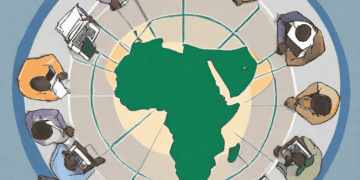Trade agreements play a pivotal role in fostering economic relationships between nations, facilitating smoother commerce and trade. These agreements vary in scope, ranging from bilateral deals involving two parties to larger-scale regional and multilateral agreements involving multiple countries.
Bilateral Trade Agreements:
Bilateral trade agreements operate between two nations with the aim of fostering a conducive environment for commerce. These agreements establish mutually agreed-upon rules for business operations, primarily focused on promoting fairness and facilitating trade access. While easier to negotiate, they have a more limited impact on economic processes compared to larger multilateral agreements.
Regional Trade Agreements:
Regional trade agreements involve two or more countries and are designed to encourage the free movement of goods and services across borders. Negotiations cover a wide spectrum of policies, going beyond tariffs to encompass various regulations and laws impacting trade, such as competition policies and government procurement rules. These agreements come in different forms:
- Preferential Trading Agreements (PTAs): Often non-reciprocal, PTAs primarily aim to reduce trade barriers among member nations, fostering economic relations and providing larger market access for developing nations.
- Free Trade Agreements (FTAs): Reciprocal in nature, FTAs aim to eliminate trade barriers among participating nations, allowing each member to independently determine external trade barriers against non-members.
- Customs Union: All participating countries in a customs union adopt a common external trade policy, including a unified external tariff regime.
Regional trade agreements can be categorized as either “Shallow,” covering tariffs and border measures, or “Deep,” encompassing a broader array of policy areas both “at the border” and “behind-the-borders.”
Nigeria’s Participation in Trade Agreements:
Nigeria actively engages in various trade agreements across different scales:
- Bilateral: Nigeria has bilateral investment agreements with approximately 31 countries, such as Morocco, Singapore, Russia, and others. Additionally, Nigeria signed a Trade and Investment Framework Agreement (TIFA) with the United States in 2000.
- Regional: As a member of the African Union and the Economic Community of West African States (ECOWAS), Nigeria is part of initiatives like the ECOWAS Trade Liberalisation Scheme (ETLS) and the African Continental Free Trade Agreement (AfCFTA), aiming to create a single market and streamline trade across African nations.
- Multilateral: Nigeria is party to agreements such as the African Growth and Opportunity Act (AGOA) and has signed agreements with the European Free Trade Area (EFTA), enhancing trade relations with various regions.
Trade Negotiations Process in Nigeria:
The National Office for Trade Negotiations (NOTN) oversees and coordinates Nigeria’s trade negotiations. Comprising members from various governmental bodies, NOTN aims to maximize Nigeria’s trade and economic potential, ensuring alignment with the country’s industrial policy and competitiveness objectives. Negotiation timelines vary, but the process involves extensive consultations and can take several years to finalize.
Interim Provisions in Trade Agreements:
International agreements, like the General Agreement on Tariffs and Trade (GATT), provide guidelines for forming customs unions or free trade areas. They permit the adoption of interim agreements necessary for their formation, emphasizing the importance of maintaining or reducing trade barriers during transitional periods. These provisions stress transparency and the need for timely communication among contracting parties to ensure effective implementation.
In conclusion, Nigeria actively participates in various trade agreements, leveraging bilateral, regional, and multilateral platforms to enhance its trade relations and economic growth. The negotiation process involves meticulous planning and coordination, while interim provisions aim to facilitate smoother transitions during the formation of trade unions or areas.
Stay current with supply chain report news at The Supply Chain Report. For international trade resources, visit ADAMftd.com.
#TradeAgreements #EconomicRelations #GlobalTrade #BilateralTrade #RegionalTrade #MultilateralTrade #NigeriaTrade #AfCFTA #ECOWAS #GlobalEconomy #FreeTradeAgreements #CustomsUnion #InvestmentFramework #NationalTradeNegotiations #InternationalCommerce #AfricaTradeRelations















